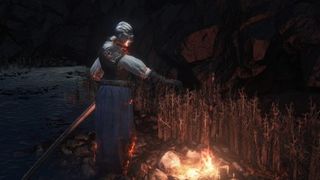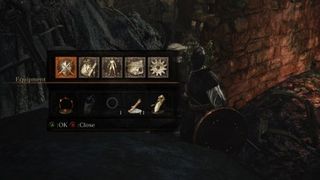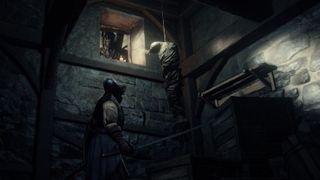Dark Souls 3 review
Consult your doctor first to see if Dark Souls 3 is right for you

In Dark Souls 3, death paves the way for progress. In that regard, it's business as usual for fans of FromSoftware's sleeper-hit series. But digging deeper into its core, it's the boldest, most approachable game that the company has ever created.
For those who haven't yet dipped their toes into this proverbial pool of piranhas, let me paint a picture.
At any moment, the rug could slip from under you. Then, said rug will proceed to beat the shit out of you. That never-relenting tension makes a crossroads out of every move. You will die...a lot. But each failure is a learning experience, calling for a change in perspective and tactics. Progress comes slow, but it's an absolute blast to play.

That unique brand of fear is back in the latest installment of Dark Souls, along with the rest of the winning formula that the series is known best for: A haunting, mysterious story that's nestled deeply into several environments, each aged and damned in their own right. Third-person combat that's easy enough to learn, but nearly impossible for the average gamer to master without flaw.
Progress comes slow, but it's an absolute blast to play.
As similar as it may be to its predecessors, Dark Souls 3 is not a mere carbon copy.
A not-so-subtle BloodBorne shout out
FromSoftware brought BloodBorne to life last year on the PS4. And it's no coincidence to see that some of its blood has been injected into the already-wicked Souls concoction.
Its ravenously fast gameplay has found a new home in Dark Souls 3. While unchanged from the standard "lock-on and attack" action in previous entries, Lothric's foes are particularly ferocious out of the gate and will present a fresh challenge for new players and veterans alike. Oftentimes, you'll think you know how an enemy or boss is going to act, only to end up both surprised and dead.
Get daily insight, inspiration and deals in your inbox
Sign up for breaking news, reviews, opinion, top tech deals, and more.

Some of the settings even appear to be Victorian Gothic-inspired, which begs the question: am I trekking through uncharted territory, or have I been here before? That's better left for you to discover.
Lastly, the new battle arts mechanic is a riff of sorts on BloodBorne's dual-purpose weapons. In case you aren't familiar, each weapon in that game could be stylishly transformed into a second variation with a flick of a button, offering its own unique moves and thus, more variety to mix up your strategy.
...a fresh challenge for new players and veterans alike.
In a similar way, battle arts lets you do more with your favorite weapons and magical staffs in Dark Souls 3. Your character will strike an intimidating pose, ready to fire off some disarming attacks on anyone (or anything) that crosses your path. These are particularly handy to try when you're up against an opponent with a tricky defense or a group of smaller enemies.

I'm most comfortable with basic katana move sets, but incorporating battle arts into my strategy required new tactics, patience, and a whole lot of ashen estus flasks, a new flask type that allows you to refill the green focus points (FP) meter. Both magic and battle arts moves now feed from this meter and you can easily adjust the number of regular vs ashen estus flasks you carry in your inventory.
So yeah, BloodBorne's impact on the Souls series is pretty obvious at times, but the melding of these two horrid universes brings nothing but good for players.
The Souls you know and love (with some changes)
Dark Souls 3 gets the little things right. On its surface, the game targets –and meets more often than not– a fluid 60 frames per second that really brings Lothric to life, for better or worse. It all loads relatively quickly, and oh yeah, the wobbly physics that inhabit the dead are back from the first title, which I'm probably too happy about. I enjoy the satisfaction of pushing slain opponents off the ledge, or just twisting them around for comedic effect in an otherwise dark world.

The bleak-as-hell atmosphere follows FromSoftware tradition and the soul-wrenching orchestral pieces that fill the air in each zone add a lot of intensity to battles, both big and small.
Dark Souls 3 gets the little things right.
The user interface, while still pretty dense with info, is more streamlined than before. For instance, the pause menu (which doesn't actually pause the game) is now home to some extra item slots.
This is perfect for frequently used items that aren't necessary in battle, like the Homeward Bone or White Sign Soapstone. It's a smart way of giving you access to more of the essentials without cluttering the screen.

In addition to making menus and combat mechanics more intuitive and easy to use, Dark Souls 3 also broadens its accessibility by being a bit more loose-lipped than before.
These titles have a reputation for being incredibly cryptic, both in the way they deliver story and how they steer you (or don't) to your objectives as you traverse the land. Looking back, it's very easy as a first-time player to get totally lost in Dark Souls or Dark Souls 2. That's not really the case anymore, or at least, the fog is a little less dense this time around.
Dark Souls 3 is a bit more loose-lipped than before.
Many Dark Souls players (myself included) value the sense of discovery in these games very highly. Figuring out the lay of the land's enemies, items and bosses is a puzzle in itself and will require a staggering amount of patience, determination and time. Finally opening shortcuts that connect far-reaching places of the game's world feels so good.

Seasoned Souls veterans know that the beginning of each game is paved in tutorial notes and that's probably all the hand-holding you're going to get. In Dark Souls 3, that's not the end of it. Sure, you see less of these developer-created messages as you proceed into tougher areas, but it sometimes extends a hand when I didn't want it.
...the fog is a little less dense this time around.
For example, you'll reach an impasse near the game's halfway point. Previous Souls games would have let you suffer until you figured it out, but this game goes ahead and tells you that you need an item to proceed. Not just that, it tells you what item you need, too. For some, this is really not a big deal, but many others enjoy figuring out the mystery themselves.
Death isn't the end
Death, as a core mechanic in the Dark Souls franchise, brings more than just a respawn. When you die, all of the souls (the game's form of currency. Sick, right?) gathered from beasts you've killed are dropped where you breathed your last. Whatever the game's objective is immediately takes a backseat to your new mission: get the souls back.

However, if you die on your way to retrieving your dropped souls, you'll lose them. All of them. Experienced Souls players know the amazingly fun risk-and-reward dilemma presented in retrieving them, as well as the crushing feeling of losing them all to bloated confidence. Simply put, this game will test your vocabulary of curse words.
But let's say you die, losing your souls isn't all that happens. You become ashen. It's a status effect, similar to losing humanity in previous Souls games, that essentially reduces you to a fraction of your former self. You'll have less health and lose the ability to summon AI or human helpers in the online component of the game. Embers can bring you back to speed, but they're rare, one-time-use items that are finite in supply and...oops, you died again? Your ember is gone.

It feels incredibly harsh at times in Dark Souls 3, as it always has, but works to nail in my earlier message that every move, whether it be physical or using up an item, is a crossroads. Sometimes, the consequences of your actions are irrevocable.
Simply put, this game will test your vocabulary of curse words.
Yeah, it's a bummer when you realize you've done something that you can't reverse, but it's what gives these games teeth, as well as a hell of a lot of replay value.
How's the online play?
Dark Souls 3 is a single-player game that can be experienced fully in offline mode. But where it really shines (praise the sun!) is as a multi-player game. With online mode on, it isn't just a bunch of players running around willy-nilly in the same world. Instead, you'll see ghosts of other players running around the land. Players (including yourself) can scribe messages on the ground along the journey to offer help, or if you're a stinker, to misguide others.

You can always see these messages, but in order to summon others into your world, you must use an ember. Since you become ashen after you die, you'll want to make the best of every go-around with a summoned player, especially when you encounter a boss fight.
Conversely, to join another someone else's game, you don't need an ember to put down your own summon sign. And sometimes, the rewards for helping out others can be huge. Not only will you earn the souls you nab in other players' worlds, but if you're lucky, you might get an ember for your cooperation.

Online play since the game's launch is a blast, as usual. Compared to previous games, I'm actually having an easier time joining and summoning fellow players, which can make the game a little easier to play.
Verdict: Play it now
The highest accolade that I can give Dark Souls 3 is that it's the best since the original Dark Souls. But is it better? In some ways, it's absolutely no contest. But FromSoftware's latest isn't after the throne. If anything, its just building upon the legacy, with a mix of old and new to move the series forward.

If this is your first Souls game, welcome, and secondly, don't give up. It'll take a little time until it hooks you. You'll get it, but you won't get it. You might even feel the need to restart completely a few times just because you wanted to do something a bit differently. And that's totally okay. Actually, I encourage it.
...the best since the original Dark Souls.
Before you know it, you'll be thinking about this game, even when you aren't playing it. Running through the world's paths in your dreams, trying to solidify your knowledge of each shortcut. Maybe even looking at bystanders a little differently, waiting for them to ambush when you walk by.
When the news hit that Dark Souls 3 would more accessible, I initially felt happy that a new audience would get into the series. Then, that gave way to the fear that it would result in a game that was too easy. Nope, this is the game you've been waiting for. FromSoftware has delivered yet another incredible game that's more than worth the price of admission.
This game was reviewed on PC.
Techradar's review system scores games as 'Don't Play It', 'Play It' and 'Play It Now', the last of which is the highest score we can give. A 'Play It Now' score suggests a game that's absolutely worth the cost. It's short on flaws and high on replayability.
Cameron is a writer at The Verge, focused on reviews, deals coverage, and news. He wrote for magazines and websites such as The Verge, TechRadar, Practical Photoshop, Polygon, Eater and Al Bawaba.
Most Popular




